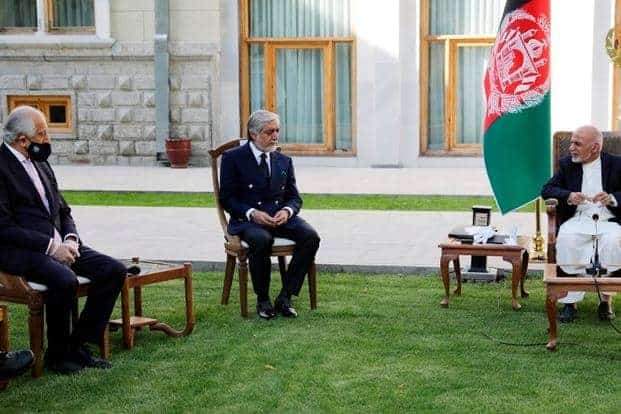US Envoy Working to Resuscitate Flagging Afghan Peace Deal

The first visit to Kabul by Washington’s peace envoy since Afghanistan's squabbling political leadership reached a power-sharing agreement comes amid increased violence blamed mostly on an Islamic State affiliate that has been targeted in stepped-up U.S. bombing.
Zalmay Khalilzad, in a flurry of tweets Thursday, told of his meetings in Doha earlier in the week with Taliban representatives and on Wednesday with Afghan President Ashraf Ghani and fellow leader Abdullah Abdullah. All were aimed at resuscitating a U.S.-Taliban peace deal signed in February.
Khalilzad returned to Washington late Wednesday.
Khalilzad called for a reduction in violence by all sides in Afghanistan's protracted conflict that has kept America militarily engaged for 19 years. He also said too much time has been wasted getting to the second and critical phase of the peace deal, which calls for talks between the Taliban and Afghanistan's political leadership.
Abdullah will head those efforts as part of the deal he signed with Ghani to end their monthslong dispute over who won Afghanistan's presidential election last September. He conceded the win to Ghani but as part of a power sharing agreement.
U.S. President Donald Trump said again last week that American soldiers have wrongly been tasked with policing the country and called on Afghanistan to step up.
The U.S. has about 12,000 soldiers deployed to Afghanistan, split between counter-terrorism and the NATO-led Resolute Support's 16,500 troop mission, which trains and aids Afghanistan's National Security Forces. Washington currently pays about $4 billion annually to keep Afghanistan's military in fighting form.
U.S. Department of Defense officials have told The Associated Press their biggest worry in Afghanistan is an increasingly active IS affiliate headquartered in the east. The group has ties to Middle Eastern affiliates as well as militant groups like the Islamic Movement of Uzbekistan and the Chinese Uighur group, East Turkestan Islamic Movement.
The officials, who spoke on condition of anonymity because of the sensitivity of the subject, say the IS affiliate in Afghanistan has been linked to foiled plots to attack America in recent years. The U.S. also blamed IS for a brutal attack on a maternity hospital earlier this month in Kabul that left 24 people dead, including two infants and several mothers.
The increased IS activity in Afghanistan has added urgency to U.S. efforts to resuscitate the peace deal, which commits the Taliban to fight terrorist groups in Afghanistan. The same Department of Defense officials said they want the Taliban in the battle to rout IS from Afghanistan.
Without intra-Afghan negotiations, the cease-fire Washington wants between the Taliban and the government won’t happen .
Taliban representatives say a cease-fire will be on the agenda in any intra-Afghan talks, which were to start by mid-March. The delay has been blamed on Afghanistan’s squabbling leadership in Kabul and disruptions in prisoner releases, which were promised as part of the peace deal ahead of intra-Afghan negotiations.
In his tweets, Khalilzad called for the prisoner release to be completed. He also reiterated he is seeking Taliban assistance with U.S. citizens missing in Afghanistan, including U.S. contractor Mark Frerichs who disappeared in January. Several Taliban leaders contacted by The AP said they are not holding Frerichs and have told Khalilzad repeated times.
Suhail Shaheen, Taliban spokesman in Doha, said Wednesday the Taliban are committed to the deal and demanded its prisoners be released.
Photo: In this May 20, 2020, photo, Afghan President Ashraf Ghani, right, and fellow leader under a recently signed power-sharing agreement, Abdullah Abdullah, center, hold a meeting with U.S. peace envoy Zalmay Khalilzad aimed at resuscitating a U.S.-Taliban peace deal signed in February, at the Presidential Palace, in Kabul, Afghanistan. (The Presidential Palace via AP)
Source: https://www.nytimes.com/aponline/2020/05/21/world/asia/ap-as-afghanistan-peace-deal.html











